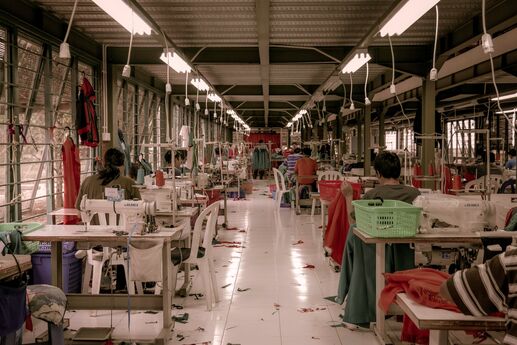Were Your Clothes Made in a Sweatshop?

Sweatshops, or factories that employ workers under poor conditions and for low wages, have long been an issue in the textile and garment industry. These factories are often located in developing countries, where labor laws are weaker and enforcement is lax. In this blog post, we will take a look at some of the world's largest textile factories, and the fashion brands that use them.
One of the largest textile factories in the world is the Rana Plaza factory in Bangladesh. In 2013, this factory collapsed, killing over 1,100 workers and injuring thousands more. The factory produced clothing for a number of international fashion brands, including Walmart, The Children's Place, and Joe Fresh. The tragedy brought international attention to the poor working conditions in Bangladesh's garment industry, and led to the creation of the Bangladesh Accord on Fire and Building Safety.
Another large textile factory is the Huajian factory in China. This factory produces shoes for a number of international brands, including New Balance, Tommy Hilfiger, and Ivanka Trump's clothing line. In 2017, the factory closed down, with the company citing rising labor costs and difficulty finding enough workers as reasons. However, workers at the factory claimed that the factory had been engaging in labor violations, and that they had been organizing to demand better working conditions.
In Bangladesh, a factory called Tazreen Fashions, was one of the largest garment factory in the country, and also one of the most notorious. Tazreen was a supplier to a number of international brands, including Walmart, Sears, and Disney. In 2012, a fire broke out in the factory, killing over 100 workers and injuring hundreds more. The factory had been operating without proper fire safety measures, and workers had been told to return to their sewing machines even after the fire alarm had sounded.
Another large factory is the PT Kizone factory in Indonesia. This factory produced clothing for a number of international brands, including Nike, Adidas, and the Gap. In 2011, the factory closed down, and the workers were left without severance pay. The workers, who were owed over $3 million in unpaid wages and benefits, launched a campaign to hold the brands accountable for their treatment.
These are just a few examples of the many large textile factories around the world that employ workers under poor conditions. These factories often produce clothing and other textile products for international fashion brands, which then sell them at a markup to consumers in developed countries. While some of these brands have taken steps to improve working conditions in their supplier factories, many have yet to do so. Fashion brands have been criticized for not taking enough responsibility for the conditions in which the clothes they sell are made. Many brands have been accused of turning a blind eye to the poor working conditions in their supplier factories, and of failing to take meaningful action to improve them. One of the reasons why many brands have been slow to take action is that they are focused on keeping costs low in order to be able to sell their products at a competitive price. However, this approach has led to a race to the bottom in terms of wages and working conditions.
Another reason is that many brands rely on a complex web of suppliers and sub-contractors, which makes it difficult to ensure that all workers are treated fairly. Brands often rely on audits of their supplier factories to ensure that they are meeting their standards, but these audits can be flawed, and may not pick up on all of the problems in a factory.
However, there are some examples of brands that have taken steps to improve working conditions in their supplier factories. For example, Nike has implemented a program called the "Fair Labor Association", which aims to improve working conditions in its supplier factories. The program includes regular inspections of factories and working conditions, as well as child welfare reporting. It is important to note that not all fashion brands are complicit in the use of sweat shops. Some brands have made a commitment to ethical and sustainable manufacturing, including Patagonia and Eileen Fisher. If you want to become more proactive in effecting change on this important issue, please do your research before you buy.
Photo by Rio Lecatompessy on Unsplash


